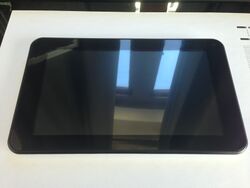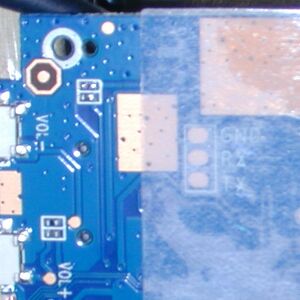Inet 86V
| Inet 86V | |
|---|---|
 | |
| Manufacturer | iNet technology |
| Dimensions | 190 mm x 115mm x 9mm |
| Specifications | |
| SoC | A13 @ 1.2GHz |
| DRAM | 353MiB @ 432MHz |
| NAND | 4GB |
| Power | 5V @ ?A, 2800mAh 3.7V Li-Ion battery |
| Features | |
| LCD | 800x480 (7" 16:9) |
| Touchscreen | 5-finger capacitive (Silead GSL1680) |
| Audio | 3.5mm headphone plug, internal speaker, internal microphone |
| Network | WiFi 802.11 b/g/n |
| USB | 1 USB2.0 OTG |
| Camera | 0.3MP (640x480) front |
Identification
In android, under Settings->About Tablet, you will find a build number that starts with 86V2 and Android version 4.0.4.
Tablet dismantle and Board identification:
iNET-86V-REV02 2012-08-07 Zeng-gc
CPU-Z Information
Model: 28126 (nuclear_evb) Manufacturer: unknown Board: nuclear Hardware: sun5i
Access by adb
root@android:/ # cat /proc/cpuinfo
Processor : ARMv7 Processor rev 2 (v7l) BogoMIPS : 1001.88 Features : swp half thumb fastmult vfp edsp neon vfpv3 CPU implementer : 0x41 CPU architecture: 7 CPU variant : 0x3 CPU part : 0xc08 CPU revision : 2 Hardware : sun5i Revision : a13b Serial : 03435cb039363030504d4e3316254217
root@android:/ # cat /proc/partitions
major minor #blocks name 93 0 26384 nanda 93 8 16384 nandb 93 16 32768 nandc 93 24 524288 nandd 93 32 1228800 nande 93 40 16384 nandf 93 48 32768 nandg 93 56 262144 nandh 93 64 262144 nandi 93 72 1472752 nandj
root@android:/ # lsmod
8188eu 621096 0 - Live 0xbf152000 mxc622x 6326 1 - Live 0xbf14c000 -> G-sensor module mecs 4078 2 - Live 0xbf148000 rtl8150 10305 0 - Live 0xbf141000 mcs7830 7581 0 - Live 0xbf13b000 qf9700 9152 0 - Live 0xbf134000 asix 24601 0 - Live 0xbf128000 sun5i_csi0 33271 0 - Live 0xbf11a000 gt2005 36907 0 - Live 0xbf10a000 gc0308 22312 1 - Live 0xbf100000 -> Camera module videobuf_dma_contig 6251 1 sun5i_csi0, Live 0xbf0fb000 videobuf_core 20242 2 sun5i_csi0,videobuf_dma_contig, Live 0xbf0f1000 cedarx 9351 0 - Live 0xbf0ea000 mali 150956 6 - Live 0xbf0b8000 ump 49278 9 mali, Live 0xbf0a4000 st1536_ts 21173 0 - Live 0xbf088000 gsl1680 177199 0 - Live 0xbf057000 pixcir_touch_811 23383 0 - Live 0xbf04c000 gt811 17146 0 - Live 0xbf043000 byd693x_ts 9094 0 - Live 0xbf033000 zet622x 19182 0 - Live 0xbf025000 ssd253x_ts 22661 0 - Live 0xbf01b000 ft5x_ts 51435 7 st1536_ts,gsl1680,pixcir_touch_811,gt811,byd693x_ts,zet622x,ssd253x_ts, Live 0xbf000000
root@android:/ # getevent
add device 1: /dev/input/event5 name: "ecompass_data" add device 2: /dev/input/event4 name: "sitronix_ts" add device 3: /dev/input/event3 -> Touchscreen module name: "gsl1680" add device 4: /dev/input/event2 -> Touchscreen module name: "gt811" add device 5: /dev/input/event0 name: "sun4i-keyboard" could not get driver version for /dev/input/mice, Not a typewriter add device 6: /dev/input/event1 name: "axp20-supplyer"
Sunxi support
Images
This Debian image for A13-OLinuXino with Hynix DDR3 RAM boots and works well except for the touchscreen.
Manual build
Mainline U-Boot can be compiled for this tablet using the A13-OLinuXino_defconfig. For the LCD to work, edit the .config file to add the LCD config for Inet 86vs from this page: LCD.
Otherwise, follow the Manual build howto.
UART

As in all other A13 boards, you cannot use microSD and UART at the same time. You have to boot from USB instead.
Consider using a MicroSD Breakout to avoid soldering. Alternatively, the Rx/Tx pads are right next to the SD card socket on the top, or in the same place on the bottom (in the same layout as in the Inet 86vs but unlabeled).
UART is disabled and configured completely wrong in the default script.bin file, so instead of the testing method suggested in the UART guide, you'll need to boot uart0-helloworld-sdboot.sunxi from USB:
sudo sunxi-fel -v uboot uart0-helloworld-sdboot.sunxi










